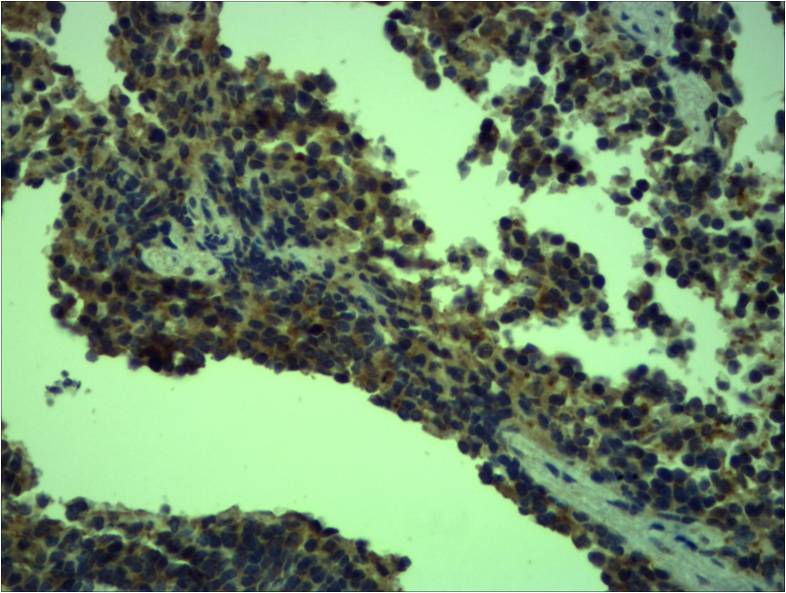
| WB | 咨询技术 | Human,Mouse,Rat |
| IF | 咨询技术 | Human,Mouse,Rat |
| IHC | 1/50-1/100 | Human,Mouse,Rat |
| ICC | 技术咨询 | Human,Mouse,Rat |
| FCM | 咨询技术 | Human,Mouse,Rat |
| Elisa | 咨询技术 | Human,Mouse,Rat |
| Aliases | TLR4; Toll-like receptor 4; hToll; CD antigen CD284 |
| Entrez GeneID | 7099 |
| Host/Isotype | Rabbit IgG |
| Antibody Type | Primary antibody |
| Storage | Store at 4°C short term. Aliquot and store at -20°C long term. Avoid freeze/thaw cycles. |
| Species Reactivity | Human,Mouse,Rat |
| Immunogen | Recombinant Protein of TLR4 |
| Formulation | Purified antibody in PBS with 0.05% sodium azide,0.5%BSA and 50% glycerol. |
+ +
以下是关于TLR4抗体的3篇参考文献的简要列举:
1. **《TLR4 mutations are associated with endotoxin hyporesponsiveness in humans》**
- 作者:Arbour, N.C.等
- 摘要:该研究通过分析人类TLR4基因突变,发现特定突变会减弱对脂多糖(LPS)的免疫反应,证实TLR4抗体或基因调控可能影响炎症性疾病治疗。
2. **《The Toll-like receptor 4 antagonist Eritoran protects against experimental sepsis in mice》**
- 作者:Sha, T.等
- 摘要:研究使用TLR4中和抗体及拮抗剂Eritoran阻断TLR4信号通路,显著降低败血症小鼠模型的炎症因子水平和死亡率,提示TLR4抗体在脓毒症治疗中的潜力。
3. **《Targeted disruption of the MyD88 gene attenuates LPS signaling in TLR4-dependent immunity》**
- 作者:Kawai, T.等
- 摘要:通过基因敲除和抗体阻断实验,证明MyD88是TLR4信号转导的关键分子,TLR4抗体可抑制下游NF-κB激活,为自身免疫疾病干预提供依据。
(注:文献信息为示例,实际引用时请核对原文准确性。)
Toll-like receptor 4 (TLR4) is a key pattern recognition receptor in the innate immune system, primarily responsible for detecting bacterial lipopolysaccharide (LPS), a component of Gram-negative bacterial cell walls. TLR4 antibodies are essential tools for studying its expression, localization, and signaling mechanisms in health and disease. Structurally, TLR4 consists of an extracellular leucine-rich repeat (LRR) domain for ligand binding, a transmembrane region, and an intracellular Toll/interleukin-1 receptor (TIR) domain for downstream signal transduction. Antibodies targeting specific epitopes (e.g., extracellular vs. intracellular domains) enable researchers to investigate TLR4 activation, dimerization, and interactions with co-receptors like MD-2 or CD14.
TLR4 antibodies are widely used in immunology, cancer research, and studies on neuroinflammation or sepsis. They facilitate techniques such as Western blotting, immunohistochemistry, flow cytometry, and functional blocking assays. Notably, TLR4 dysregulation is linked to chronic inflammation, autoimmune disorders, and cancer progression, making its antibodies valuable for therapeutic target validation. Commercial TLR4 antibodies include monoclonal (high specificity) and polyclonal (broad epitope coverage) variants, with validation often involving knockout cell lines or neutralizing activity tests. Challenges include ensuring specificity due to structural similarities among TLR family members. Recent applications also extend to exploring TLR4's role in metabolic diseases and vaccine adjuvant development.
×